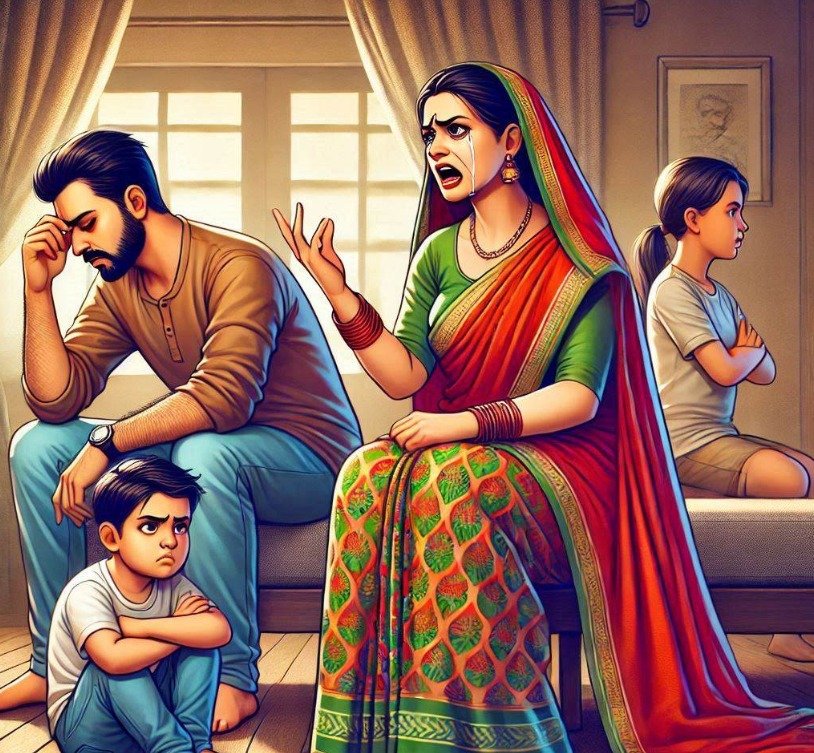In Indian society, it’s not uncommon to hear the advice, “Baccha kar lo, rishta theek ho jaayega” (Have a child, and your relationship will improve) when a couple is navigating matrimonial discord. This suggestion, often offered by well-meaning parents or elders, stems from traditional beliefs that the arrival of a child can bring stability, joy, or even a sense of renewed purpose to a strained marriage.
However, this seemingly harmless piece of advice can lead to far-reaching consequences for the couple and their future child. Parenthood is a life-altering responsibility that requires emotional stability, mutual understanding, and a strong partnership. Introducing a child into a tumultuous environment can exacerbate existing conflicts, strain the fragile dynamics further, and place undue emotional burden on the child.
Instead of becoming a solution, the decision to have a child under such circumstances often transforms into an additional layer of stress, making it imperative to address the underlying issues first. In this blog, we delve into why resolving relationship challenges before stepping into parenthood is not just beneficial, but essential for the well-being of all involved.
Some key reasons why couples in India should avoid conceiving while in a complicated relationship or legal dispute:
1) Impact on Child’s Well-being: Children thrive in stable and nurturing environments. A complicated relationship or ongoing legal battle can create a stressful atmosphere that might negatively impact the child’s emotional and psychological well-being.
2) Parental Responsibility: Raising a child requires a high level of cooperation and understanding between parents. If the couple is struggling with conflict, it can be challenging to provide the consistent and loving care a child needs.
3) Legal Implications: Conceiving a child while in a legal dispute can complicate custody and parental rights issues. Legal battles over custody, child support, and other matters can become more contentious and prolonged.
4) Financial Stability: Legal disputes can be costly. Adding the financial responsibility of raising a child during this period can increase stress and strain the couple’s financial resources, impacting the child’s quality of life.
5) Emotional and Mental Health: High levels of conflict and stress can affect the mental health of both parents. This can result in an unstable environment for the child, affecting their development and emotional security.
6) Relationship Stability: A child will not necessarily resolve underlying issues in a relationship. In fact, bringing a child into a troubled relationship can exacerbate existing problems and create additional strain.
7) Focus on Resolution: Resolving relationship issues or legal disputes before conceiving allows both partners to focus on establishing a strong, supportive foundation for their family, ensuring a healthier environment for the child.
8) Support Systems: Having a stable relationship or resolving legal disputes can help in creating a reliable support system for the child, including extended family and community resources, which can be crucial for a child’s development.
When couples in India conceive or have a child while in a complicated relationship or legal dispute, several legal complications can arise:
1) Custody Disputes: If the couple separates or divorces, custody battles can become contentious. The legal process of determining custody can be lengthy and emotionally taxing, affecting the child’s stability.
2) Child Support and Maintenance: Legal disputes over child support and maintenance can arise, potentially leading to prolonged legal battles over financial responsibilities and the well-being of the child.
3) Parental Rights: Disagreements over parental rights, including visitation and decision-making authority, can complicate matters, requiring legal intervention to resolve these issues.
4) Legal Proceedings Impact: Ongoing legal proceedings, such as divorce or separation cases, can be complicated by the presence of a child, influencing the legal strategy and adding complexity to the case.
5) Family Law Issues: Disputes may involve complex family law issues, including property rights, inheritance, and the child’s future, which can be complicated by the existing legal battles.
6) Mental Health Considerations: Legal disputes and relationship issues can affect the mental health of the parents, which may impact their ability to effectively co-parent and make decisions in the child’s best interest.
7) Social Stigma and Legal Perceptions: Societal perceptions and legal biases may affect the case, with judges and legal professionals potentially influenced by the couple’s personal disputes, impacting decisions related to custody and support.
8) Enforcement of Orders: Ensuring compliance with court orders related to custody, support, and visitation can be challenging, especially if the relationship between the parents remains strained.
Conclusion:
Choosing to bring a child into the world is a life-changing decision that should be made with careful thought and mutual understanding. While the advice to “have a child to fix a relationship” might come from a place of cultural tradition or familial hope, it often overlooks the emotional, mental, and practical realities of parenting. A child thrives in an environment of love, stability, and harmony—conditions that are difficult to create if the foundation of the relationship is already shaky.
Instead of looking for temporary solutions to mask deeper conflicts, couples should prioritize open communication, counseling, and a commitment to resolving their issues. Addressing these challenges not only strengthens their bond but also ensures a healthier, more nurturing environment for future children.
Parenthood should be a shared journey of joy and responsibility, not a remedy for unresolved pain. By making the effort to heal and rebuild before taking this significant step, couples can create a family rooted in love, understanding, and mutual respect—a foundation that benefits everyone involved.

